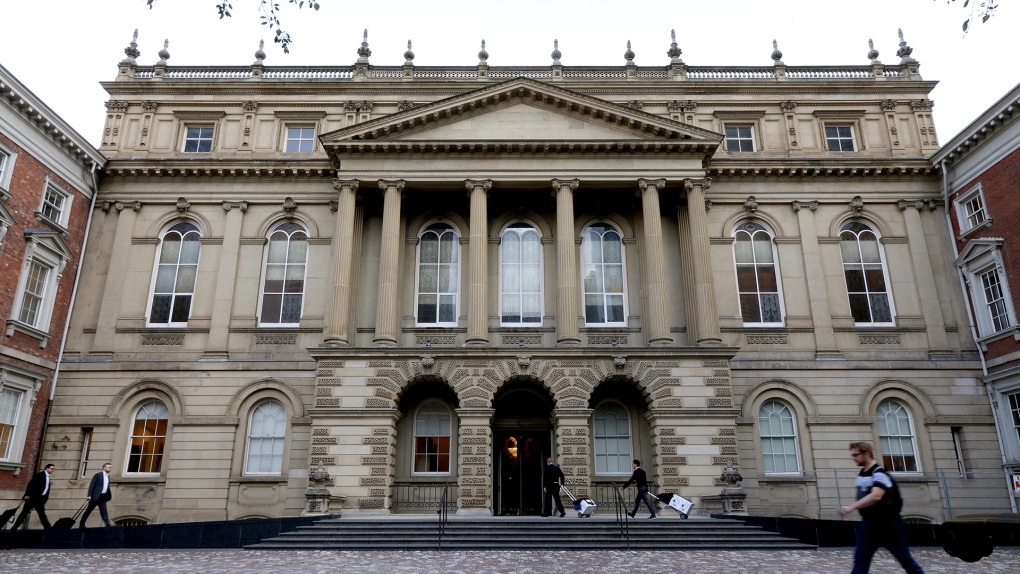Law Society of Ontario's actions against applicants accused of cheating on bar exam violated 'procedural fairness,' court rules
 Osgoode Hall is seen in Toronto on Wednesday, Sept. 25, 2019. THE CANADIAN PRESS/Colin Perkel
Osgoode Hall is seen in Toronto on Wednesday, Sept. 25, 2019. THE CANADIAN PRESS/Colin Perkel
The Law Society of Ontario violated “procedural fairness” with some of the “punitive” measures it imposed on applicants accused of cheating on the bar exam two years ago.
The LSO previously voided the exam results of more than 100 candidates who wrote the November 2021 test after the law society said it had come to light that exam materials had been improperly accessed. The LSO accused the candidates of engaging in “prohibited actions” and also voided their registration in the licensing process while preventing them from re-applying for one year.
- Download our app to get local alerts on your device
- Get the latest local updates right to your inbox
While the decision to void the test results was warranted, the other measures “substantially impacted the applicants to the point of being punitive,” read a divisional court decision released last week.
“It was a violation of procedural fairness to impose that level of consequence without holding a hearing or reaching a determination that the applicants had engaged in intentional misconduct,” the decision read.
“On the issue of remedy, we quash the LSO’s decisions other than the voiding of exam results and remit these matters to the LSO to determine next steps in accordance with these reasons.”
The LSO began conducting the exams online in the spring of 2020 as a result of the COVID-19 pandemic. After it was discovered that test materials were being leaked, in-person exams resumed last year.
In the summer of 2022, the LSO launched a lawsuit against NCA Exam Guru, which provides bar exam test preparation. The company’s director, Mississauga resident Aamer Chaudhry, is also named in the suit. The LSO alleges that the company has “been obtaining and providing to those enrolled in its preparation courses documents containing questions from the licensing examinations.”
The LSO also accused the company of providing the answers to those questions, allowing clients to cheat on licensing examinations.
The decision notes that the applicants involved have “suffered a permanent stain on their reputation.”
“It has been almost two years since they wrote their exams. Their professional lives have been in limbo and they have undoubtedly suffered personally as a result,” the decision read.
It noted that the actions of the LSO could hurt candidates in terms of future employment prospects.
“The LSO highlighted that it would share the decision with legal regulators across Canada. Similarly, the finding of a regulatory sanction could prevent the Applicants from successfully applying to a different regulated profession where this would need to be disclosed,” the decision stated.
“A law firm interested in hiring an Applicant could ask questions that would elicit this history and then be dissuaded from hiring the lawyer or paralegal.”
The decision notes that while the LSO “faced an administrative challenge in this case,” that “cannot override the Applicants’ fundamental right to procedural fairness.”
CTVNews.ca Top Stories

BREAKING Emergency crews responding to avalanche in Whistler, B.C., area
Paramedics and search crews have been dispatched to the scene of an avalanche that struck Monday in the Whistler, B.C., area.
Quebec fugitive killed in Mexican resort town, RCMP say
RCMP are confirming that a fugitive, Mathieu Belanger, wanted by Quebec provincial police has died in Mexico, in what local media are calling a murder.
Trump again calls to buy Greenland after eyeing Canada and the Panama Canal
First it was Canada, then the Panama Canal. Now, Donald Trump again wants Greenland. The president-elect is renewing unsuccessful calls he made during his first term for the U.S. to buy Greenland from Denmark, adding to the list of allied countries with which he's picking fights even before taking office.
Canada regulator sues Rogers for alleged misleading claims about data offering
Canada's antitrust regulator said on Monday it was suing Rogers Communications Inc, for allegedly misleading consumers about offering unlimited data under some phone plans.
Pioneering Métis human rights advocate Muriel Stanley Venne dies at 87
Muriel Stanley Venne, a trail-blazing Métis woman known for her Indigenous rights advocacy, has died at 87.
Bill Clinton hospitalized with a fever but in good spirits, spokesperson says
Former President Bill Clinton was admitted Monday to Georgetown University Medical Center in Washington after developing a fever.
Multiple OnlyFans accounts featured suspected child sex abuse, investigator reports
An experienced child exploitation investigator told Reuters he reported 26 accounts on the popular adults-only website OnlyFans to authorities, saying they appeared to contain sexual content featuring underage teen girls.
King Charles ends royal warrants for Ben & Jerry's owner Unilever and Cadbury chocolatiers
King Charles III has ended royal warrants for Cadbury and Unilever, which owns brands including Marmite and Ben & Jerry’s, in a blow to the household names.
Man faces murder charges in death of woman who was lit on fire in New York City subway
A man is facing murder charges in New York City for allegedly setting a woman on fire inside a subway train and then watching her die after she was engulfed in flames, police said Monday.






























